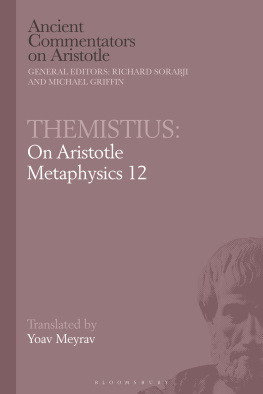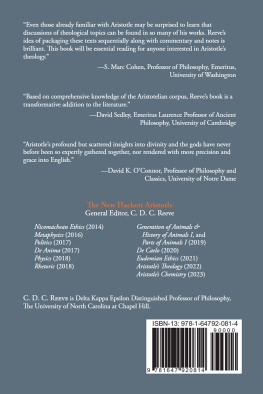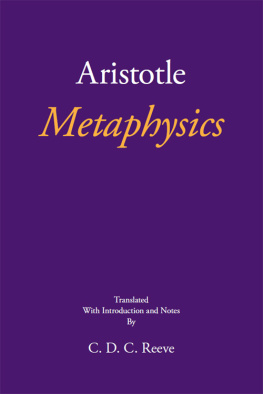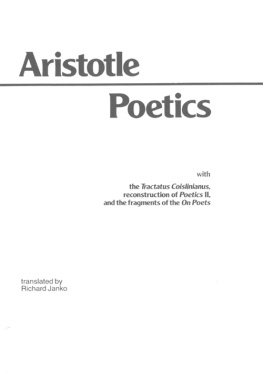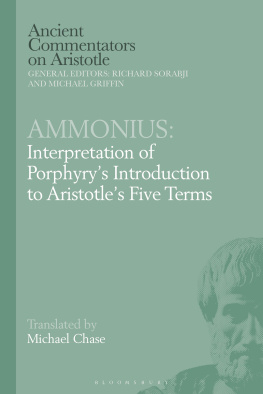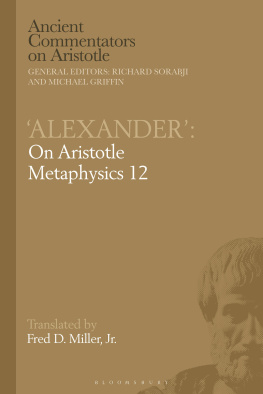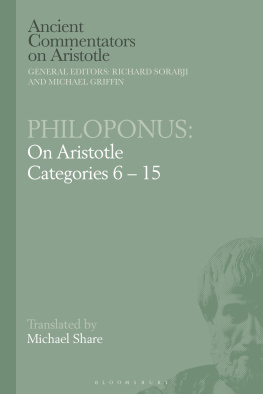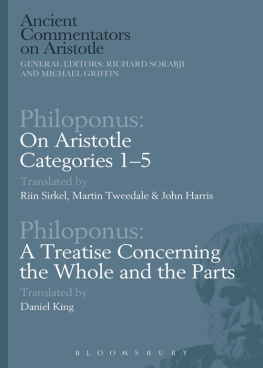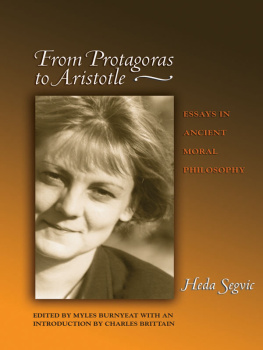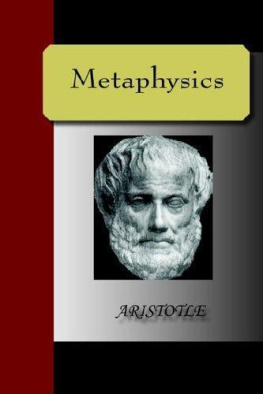
Themistius
On Aristotle:
Metaphysics 12
Ancient Commentators on Aristotle
GENERAL EDITORS: Richard Sorabji, Honorary Fellow, Wolfson College, University of Oxford, and Emeritus Professor, Kings College London, UK; and Michael Griffin, Assistant Professor, Departments of Philosophy and Classics, University of British Columbia, Canada.
This prestigious series translates the extant ancient Greek philosophical commentaries on Aristotle. Written mostly between 200 and 600 AD, the works represent the classroom teaching of the Aristotelian and Neoplatonic schools in a crucial period during which pagan and Christian thought were reacting to each other. The translation in each volume is accompanied by an introduction, comprehensive commentary notes, bibliography, glossary of translated terms and a subject index. Making these key philosophical works accessible to the modern scholar, this series fills an important gap in the history of European thought.
A webpage for the Ancient Commentators Project is maintained at ancientcommentators.org.uk and readers are encouraged to consult the site for details about the series as well as for addenda and corrigenda to published volumes.

Acknowledgements
The present translations have been made possible by generous and imaginative funding from the following sources: the National Endowment for the Humanities, Divison of Research Programs, an independent federal agency of the USA; the Leverhulme Trust; the British Academy; the Jowett Copyright Trustees; the Royal Society (UK); Centro Internazionale A. Beltrame di Storia dello Spazio e del Tempo (Padua); Mario Mignucci; Liverpool University; the Leventis Foundation; the Arts and Humanities Research Council; Gresham College; the Esme Fairbairn Charitable Trust; the Henry Brown Trust; Mr and Mrs N. Egon; the Netherlands Organisation for Scientific Research (NOW/GW); the Ashdown Trust; the Lorne Thyssen Research Fund for Ancient World Topics at Wolfson College, Oxford; Dr Victoria Solomonides, the Cultural Attach of the Greek Embassy in London; and the Social Sciences and Humanities Research Council of Canada. In particular, this volume was supported by a BA/Leverhulme Small Research Grant. The editors wish to thank Yehuda Halper for his comments; Dawn Sellars for preparing the volume for press; and Alice Wright, Publisher, along with Georgina Leighton at Bloomsbury Academic, for their diligence in seeing each volume of the series to press.
Contents
This translation was set in motion by Carlos Fraenkel, who initiated it and allocated funding for it a long time ago, overseeing its various stages ever since. It was originally intended to be a co-translation, but regretfully, constraints of time and circumstance have deemed this to be otherwise. Nevertheless, translating this work would not have been possible without Carlos, and I am highly indebted to his mentoring and friendship.
I owe many thanks to Yehuda Halper, who spent a lot of time and energy reading and commenting upon significant portions of this translation, offering priceless advice concerning content and readability and saving me from many errors. Special thanks are also due to Stephen Menn, for valuable insights on some of the more puzzling passages in this puzzling text, and to Istvn Bodnr for his advice concerning the astronomical parts. I also thank my dear friends and colleagues Orna Harari, Michael Engel, and Daniel Davies for numerous helpful comments and suggestions, and Hanna Paulmann for her help during the proofing stage. I am sure that the present translation still contains many shortcomings; I am solely responsible for all of them.
Warm thanks are due to Richard Sorabji for his encouragement, advice, and patience as this translation slowly progressed, as well as for his comments and suggestions concerning the introduction. I would also like to thank Dawn Sellars and John Sellars for their professional and pleasant preparation of this book for press.
Since arriving at the Maimonides Centre for Advanced Studies (MCAS) in Universitt Hamburg, I was able to test-drive parts of this translation in front of many members of the Centre. I would like to thank the staff and fellows there, and especially MCASs director Giuseppe Veltri and its co-directors Racheli Haliva and Stephan Schmid. I cannot think of a better working environment.
This translation is dedicated with love, respect, and gratitude to my parents, Nurit and Shmuel Meyrav.
| [] | Square brackets enclose words or phrases that have been added to the translation for purposes of clarity. |
Constantinople where he also ran a successful school Themistius occupied different political functions in the Eastern capital. Managing to remain a leading political figure under six different emperors, he was also one of the finest orators of his time. Sometimes dismissed by ancient and modern authors as a flatterer, a sophist, or a spin doctor, and being no stranger to subtle manipulation, white lies, and a tendency for self-aggrandizing disguised as humility, Themistius was nevertheless able to play an important role in shaping imperial policies on religious toleration and freedom of speech, and his core politico-philosophical views as expressed in his orations remained consistent throughout his career.
Apart from a few exceptions, Themistius corpus falls into two groups: his orations (public and private),Eugenius whose own philosophical orientation is an open question but who himself had learnt from Themistius grandfather. In other words, Themistius is a part of an idiosyncratic legacy that had no formal ties to any of the established schools.
Despite its unique position as the only ancient interpretative composition about Aristotles Metaphysics 12 that has survived in its entirety, Themistius paraphrase has received relatively little attention from scholars of Ancient philosophy. This is not due to a failure to acknowledge the works philosophical and historical significance, but because its source material is removed from its original context: Themistius Greek text is lost, its Arabic translation survived only in part, and the earliest complete version of the paraphrase survives in Medieval Hebrew. This state of affairs and its bearings on the text and its translation are described in the last part of the present introduction.
The paraphrases cultural and linguistic domains of influence are also somewhat unusual; whereas the work did not leave any identifiable mark on Late Antique philosophy,
Themistius paraphrase contains several novel philosophical elements that go well beyond what Aristotle writes explicitly, often leaving the reader to wonder whether the ideas it contains can indeed follow from his words. I address some of these ideas below, but first let me offer some remarks about Themistius distinctive paraphrastic method of interpreting Aristotle and the challenges it poses.
Themistius Paraphrases
Mastering it was considered essential for the successful composition of different kinds of speeches and for the sake of acquiring proficiency and the ability to express oneself in the style of various poets, historians, and other authors. The basic principle of the paraphrasis was changing the formulation while retaining the same thoughts, and this was accomplished by a set of methods applied on a target text, either in a simple manner or by way of combination of methods. The exercises were considered beneficial in helping students understand the meaning of the object paraphrased. They were useful for memorizing texts, allowed students to express themselves in the manner of the ancients, and rendered texts clearer and more expressive.
Next page
